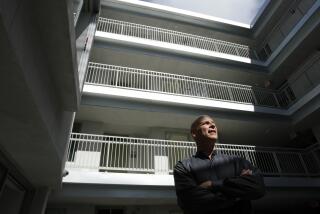KB HOME CEO OUSTED OVER STOCK OPTIONS
One of California’s highest-paid executives, KB Home chief Bruce Karatz, was ousted Sunday, becoming the latest casualty in a national scandal over the manipulation of lucrative stock option grants.
The Los Angeles-based home-building company said an internal investigation by its board concluded that from 1998 to 2005, Karatz had a direct role in setting “incorrect” dates for stock option grants that inflated their value for himself and other executives.
Karatz, 61, has reaped hundreds of millions of dollars running the fifth-biggest U.S. home builder, much of which came in recent years from cashing in stock options awarded for his performance during the recently ended housing boom. Last year, he took in $155 million, mostly from options, on an annual salary of $1 million. On Sunday, KB Home said Karatz had agreed to repay the company $13 million and retire effective immediately.
Karatz becomes one of the highest-profile executives to be fired in the option scandal. More than 150 U.S. companies are under internal or external investigations of alleged efforts to inflate the value of option grants, which are often used by companies to provide top performers a chance to profit from rises in a company’s stock price.
Many of the probes have focused on so-called backdating, in which the dates on grants are timed to coincide with low points in the stock price. Doing so increases the potential profit for the recipient.
The company was careful to say that the investigation didn’t reach any conclusion about whether there was intentional wrongdoing on Karatz’s part.
KB Home on Sunday named Jeffrey T. Mezger, 51, the company’s chief operating officer, to succeed Karatz. It also fired another executive, and a third executive resigned.
The Karatz ouster ends the career of one of the Southland’s longest-serving corporate leaders, who directed the transformation of a mid-size regional firm into a national powerhouse. The firm, formerly named Kaufman & Broad, also was an instrumental player in the suburbanization of Southern California, building affordable tract homes throughout the region.
A 34-year veteran of the company, Karatz had served as CEO since 1986.
“I am extremely proud of everything that the entire KB team and I have accomplished over the past 20-plus years,” Karatz said in a statement. He declined to comment further.
Option grants are rights to buy stock at a set price within a certain time period. They have become widely used over the last three decades as a compensation tool in corporate America, for executives and for rank-and-file employees.
But over the last year internal company investigations and probes by federal authorities have uncovered widespread manipulation of option grants as far back as the early 1990s.
Securities regulations generally require that the purchase price of an option be the stock’s market price on the day the option is granted by the company’s board.
It now appears that many companies engaged in backdating of option grants -- looking back weeks or months for a date when the stock was trading at its lowest price, say, for that quarter.
Backdating can be legal if it’s disclosed to shareholders. But it appears that few if any companies that engaged in the practice ever disclosed it publicly. That opens executives to civil, and possibly criminal, securities fraud charges, unless they can show that the practice simply resulted from sloppy bookkeeping.
The hard-driving Karatz is considered one of the building industry’s most successful -- and charismatic -- leaders. Under his management, KB Home has largely shaken its reputation as a builder of entry-level homes and grown into a builder with international presence that constructs a wide variety of projects, including high-rise condos, master-planned suburban communities and multimillion-dollar mansions with golf course views.
Last year, KB built more than 37,000 homes in the U.S. and France and posted nearly $10 billion in sales. It has 6,700 employees.
Founded by Eli Broad and partner Don Kaufman in Detroit in 1957, Kaufman & Broad set out to build entry-level homes that were affordable for a wider range of the public. The company started building homes in Phoenix a few years later, and in 1961, moved its headquarters to Los Angeles to build homes in Southern California.
The company was prolific, and by 1977, it had built 100,000 homes. It launched so many housing projects that Kaufman & Broad became a symbol of the new suburban tract houses that still dominate the region’s home building today.
Karatz brought to the company a flair for marketing and image-building. He once built a life-size replica of the Simpsons’ cartoon house in Las Vegas. Recently, the company has partnered with Martha Stewart to build homes, and the company built a 3,000-square-foot home for a family on the television series “Extreme Makeover: Home Edition.”
Karatz also had his company become the first major builder to enter the New Orleans market after Hurricane Katrina, and to take a stake in downtown L.A.’s burgeoning renaissance with plans to build luxury condos across from Staples Center.
“Bruce is clearly regarded as one of the top CEOs in the industry,” said John Burns, an Irvine-based consultant who has worked with KB and other builders. “KB is one of the most improved home builders over the last five years. He’s been very much responsible for the tremendous growth the company’s had.”
But Karatz’s ouster also comes as the company is suffering from a housing slump that has led to plunging sales and high cancellations of orders. KB Home’s stock price has lost almost half its value since mid-2005, after rising tenfold during the boom years of 2000-05.
KB Home declined to provide details of the timing of its option grants. But the company said that Karatz and Gary Ray, KB’s head of human resources, selected the dates for the options given to Karatz and other executives from 1998 to 2005, apparently without the knowledge or input of board members or the other executives. The company said Sunday that it had fired Ray and that KB’s chief legal officer, Richard Hirst, had resigned.
Several shareholders have filed suit over the stock option issue, believing that it has driven down KB Home’s stock price.
In particular, two grants to Karatz seem to coincide with notable low closing stock prices, according to KB Home filings. On Oct. 25, 1999, the date of the year’s lowest closing price, Karatz received options for 450,000 shares. On Oct. 13, 2000, that month’s lowest closing price, he received 500,000. He has received options on no fewer than 250,000 shares a year since 1998, according to filings.
To be sure, few have benefited more from the nation’s recent housing boom than Karatz and his builder CEO peers. Since 2000, he has taken home $124.7 million in cash and outright gifts of company stock. What’s more, he has reaped $167.71 million in gains from stock options granted by the company, two-thirds of which were pocketed in 2005 alone.
Karatz also has an additional $127 million in option grants that he has yet to cash out.
His wealth has led to a number of philanthropic projects, including his lead role in raising $15 million to finance computer upgrades at the Los Angeles Police Department.
“He’s not only a great friend of mine, he’s also a great friend of Los Angeles,” said former Mayor Richard Riordan, who worked with Karatz on the Police Department effort. “Bruce has a lot more to give, and I don’t think we’ve seen the last of him.”
Riordan declined to comment directly on Karatz’s ouster from KB Home.
Karatz’s lavish compensation has been under fire, long before news of potential options backdating surfaced this summer.
KB Home’s board of directors was given high marks for dealing with its stock option problem so aggressively.
“They’ve overpaid this CEO in the past, and the fact that they are exercising their oversight now is very encouraging,” said Nell Minow, editor of the Corporate Library, a corporate governance research firm.
She also noted that it’s rare for a company to specify the reason for a CEO’s departure. “Normally, no matter what the reasons, the CEOs are leaving ‘to spend more time with their family.’ ”
It was not clear whether Karatz would retire under all terms of his employment package, which allows him 100% of his average base pay in retirement -- which contractually can’t drop below $900,000 annually -- for 25 years.
elizabeth.douglass@latimes .com
tom.petruno@latimes.com
*
Times staff writer Kathy M. Kristof contributed to this report.
More to Read
Inside the business of entertainment
The Wide Shot brings you news, analysis and insights on everything from streaming wars to production — and what it all means for the future.
You may occasionally receive promotional content from the Los Angeles Times.










